The choice of platform can significantly impact the trajectory of decentralized applications (DApps). Avalanche offers a combination of unparalleled speed, scalability, and sustainability.
Its lightning-fast transaction speeds and Subnets architecture redefine scalability, allowing for a network of interconnected blockchains validated by dynamic subsets of validators. Moreover, Avalanche's commitment to sustainability sets it apart, with its energy-efficient design consuming only a fraction of the energy compared to traditional blockchain networks.
To learn more, you can head over to our full Avalanche review.
As the popularity of Avalanche-based DApps continues to soar, the importance of selecting the right wallet solution cannot be overstated. A reliable wallet — whether hardware, desktop or mobile — ensures secure storage of your AVAX tokens and provides seamless integration with the Avalanche ecosystem, empowering users to manage their assets and interact with the decentralized finance (DeFi) app of choice.
In this article, we will explore the best Avalanche wallets available. From feature-rich software wallets to secure hardware storage options, we will delve into the diverse range of options.
How to Choose the Best Avalanche Wallet
Selecting the right cryptocurrency wallet is critical for your journey into the Avalanche ecosystem. Not all wallets are created equal, and understanding the key features to look for can help ensure the security and convenience of your digital assets.
Here are some important considerations when choosing a wallet:
- Control over Private Keys: Opt for wallets that grant you full control over your private keys. While this autonomy empowers you to manage your funds independently, it also entails the responsibility of safeguarding your keys to prevent any loss or unauthorized access.
- User-Friendly Interface: A well-designed user interface can significantly enhance your wallet experience. Look for wallets with intuitive navigation and visually appealing layouts, making it easy to access and manage your assets with confidence.
- Active Development Community: An active and engaged development community is indicative of ongoing support, frequent updates, and timely resolutions to any security vulnerabilities. Prioritize wallets backed by a dedicated team of developers committed to refining and improving the platform.
- Backup and Recovery Options: Ensure your chosen wallet offers robust backup and recovery features. This typically involves the creation of a secure seed phrase that can be used to restore access to your funds in the event of device loss or failure. Explore wallets that provide straightforward mechanisms for setting up and accessing these backup options.
- Reputation: A wallet's reputation is a key factor to consider. Conduct thorough research and read reviews from other users to gauge the reliability and performance of the wallet over time. A positive reputation signifies trustworthiness and reliability, offering peace of mind for users entrusting their assets to the platform.
When it comes to Avalanche, there are a few other things you should keep in mind.
Avalanche comprises three chains:
- X-Chain for digital asset creation and trading
- P-Chain for validator coordination and subnet tracking
- C-Chain for smart contract creation and execution
Since the C-Chain is important for DeFi interactions, an ideal Avalanche wallet should support it for comprehensive DeFi engagement. Since Avalanche runs on a PoS consensus, you'd do well to choose a wallet with staking functionality.
Best Avalanche Wallets
The choice of wallet plays a crucial role in determining the features and security level it offers. It's essential to select a wallet that matches your security requirements and usage scenario.
This compilation of the best Avalanche wallets isn't ordered from best to worst or vice versa. Instead, the goal is to present you with a variety of options and provide a brief overview of their features.
Core Wallet
Core, developed by Ava Labs, serves as an all-in-one self-custodial crypto wallet and web portfolio, designed to streamline user transactions and portfolio management.
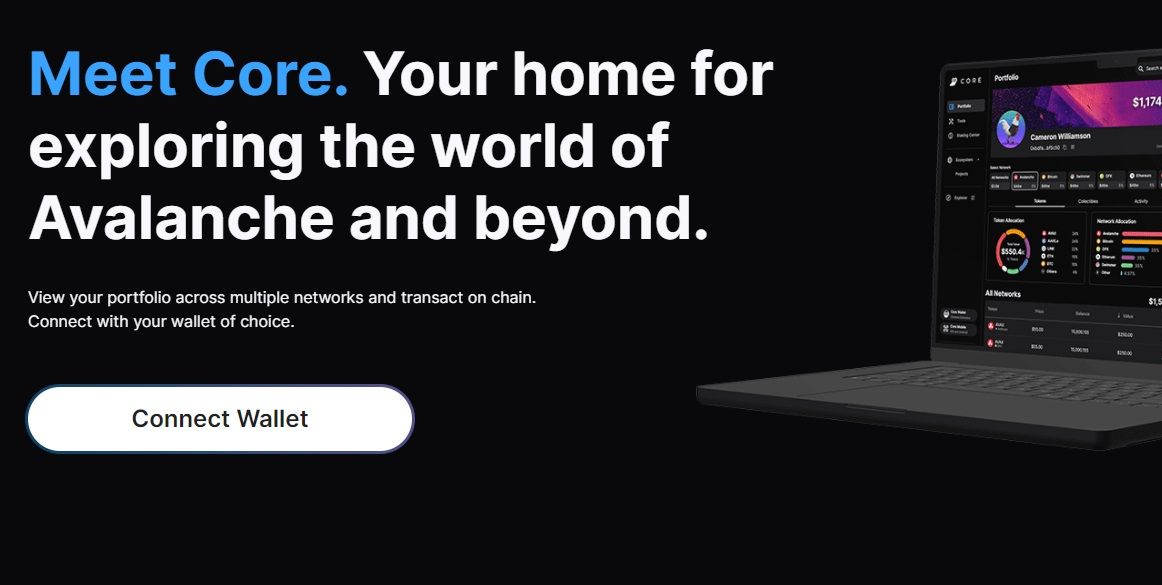 Developed by Ava Labs, Core Serves As An All-In-One Self-Custodial Wallet And Web Portfolio. Image via Core
Developed by Ava Labs, Core Serves As An All-In-One Self-Custodial Wallet And Web Portfolio. Image via CoreIt supports all three Avalanche chains, along with Bitcoin, Ethereum, and other EVM-compatible blockchains. Key features include:
- A user-friendly interface
- Cross-platform availability across web and mobile
- Bridging capabilities for transferring assets to Avalanche DApps
- Staking of AVAX
Additionally, users can explore projects and subnets, access tools like a built-in faucet for testnet operations, and benefit from security measures such as seed abstraction and encryption using Cubist's CubeSigner service.
Ledger
Ledger is popular in the world of hardware wallets, and you can use its wallets to manage AVAX and other assets on the Avalanche C-Chain via the Ledger Live app.
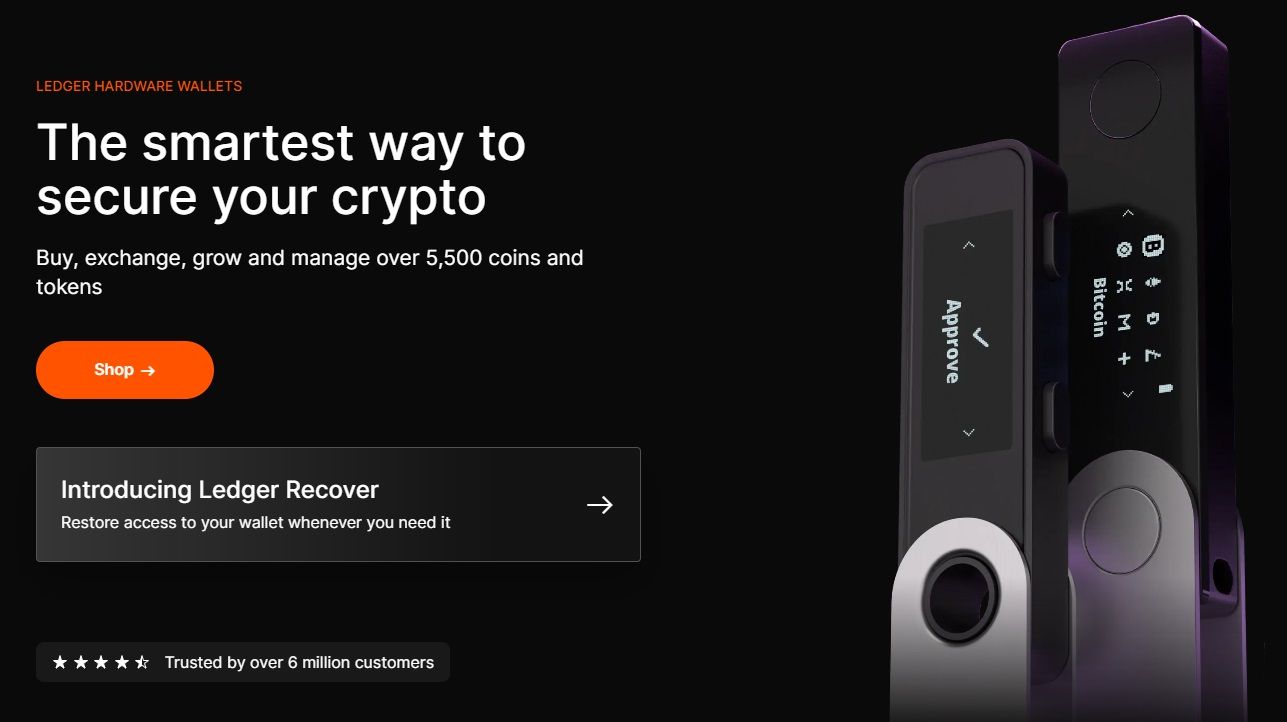 Ledger Is A Popular Hardware Wallet. Image via Ledger
Ledger Is A Popular Hardware Wallet. Image via LedgerBy using the Ledger Live wallet app alongside a Ledger hardware wallet, you can securely manage your crypto portfolio, execute transactions, and track your holdings. Ledger currently offers three hardware wallets, but the two most famous ones are:
- Ledger Nano S Plus, priced at €65.83
- Ledger Nano X, priced at €124.17
The Ledger hardware wallet ensures transaction security by validating them, while the app allows you to manage thousands of crypto assets. You can easily buy crypto using various service providers like Paypal and MoonPay, with purchased assets landing safely in your Ledger wallet.
Swapping crypto within the Ledger Live app allows you to explore different assets without involving fiat currencies, while staking lets you earn rewards by putting your crypto to work.
Trust Wallet
Trust Wallet offers a suite of features to ensure your Avalanche assets stay secure. With tools like the Trust Wallet Security Scanner and Encrypted Cloud Backup, users can rest assured knowing their assets are protected. It supports the supports the Avalanche C-Chain.
 Trust Wallet Offers Features Like a Security Scanner and Encrypted Cloud Backup To Keep Your AVAX Safe. Image via Trust Wallet
Trust Wallet Offers Features Like a Security Scanner and Encrypted Cloud Backup To Keep Your AVAX Safe. Image via Trust WalletAs a non-custodial wallet, you retain control over your Avalanche wallet. Your private keys and secret phrases are securely stored and inaccessible to anyone but you.
In addition, Trust Wallet facilitates seamless transactions, allowing users to convert fiat currencies like USD, EUR, and GBP into AVAX, as well as conduct sell-offs for fiat. Additionally, users can explore features like swapping cryptocurrencies, all while enjoying competitive rates from various payment providers.
If you're interested to learn more, you can check out our full Trust Wallet review.
Trezor
Trezor is another famous hardware wallet company. It offers three wallets that support Avalanche:
- The entry-level Model One, which costs $59
- The pricey Model T, which costs $179
- Safe 3, which is in the middle at $79
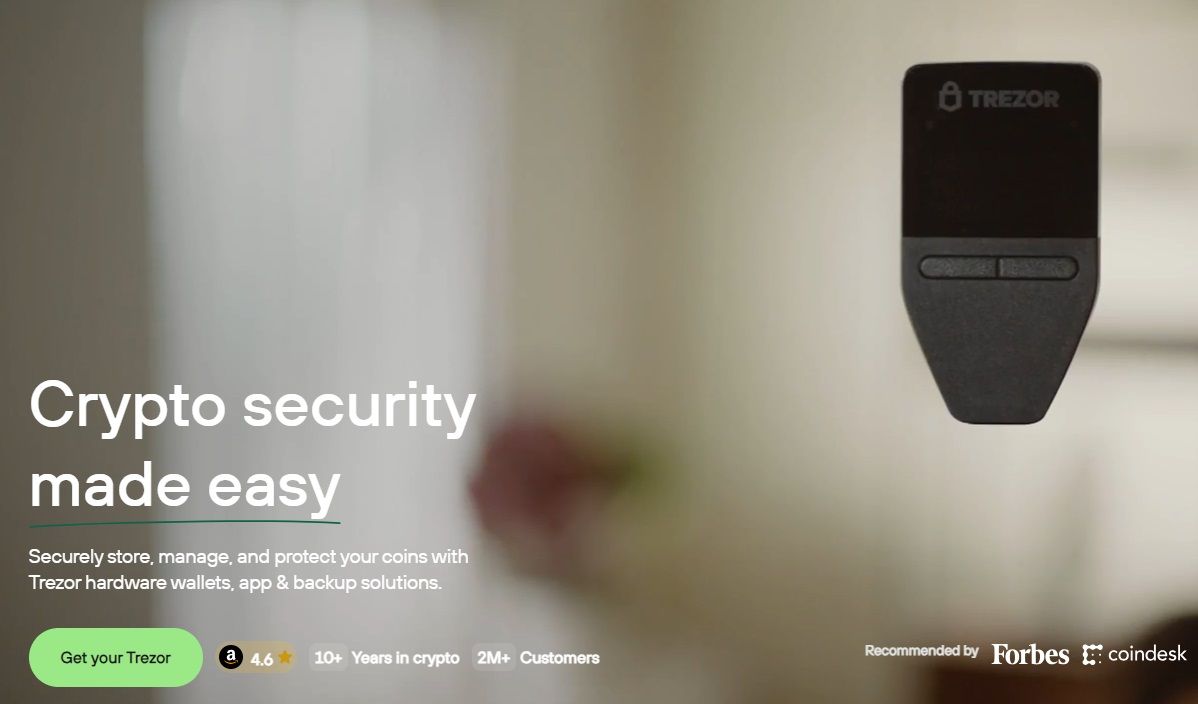 All Three of Trezor's Hardware Wallets Support AVAX. Image via Trezor
All Three of Trezor's Hardware Wallets Support AVAX. Image via TrezorThe Trezor Safe 3 is the latest self-custodial offering from Trezor. It supports over 8,000 coins and tokens, and privacy-minded individuals will be happy to know it supports CoinJoin and the Tor browser.
From a price perspective, the Safe 3 sits between Trezor's two other offerings. However, it has something the other two don't — a dedicated security chip, called the Secure Element. It is EAL6+ certified, higher than the certification achieved in previous Trezor models. The new chip performs two jobs:
- It enhances the physical security of the wallet by adding a layer of safety to the PIN protection mechanism.
- It plays an important role in verifying the authenticity of the device.
You can check out our full Safe 3 review to learn more.
MetaMask
MetaMask is a widely-used cryptocurrency hot wallet, offering support for Ethereum, its Layer 2 networks, and standalone EVM blockchains, including Avalanche's C-Chain. With MetaMask, users can effortlessly connect to DApps on compatible chains and manage their crypto assets across both web and mobile devices.
 MetaMask Supports Avalanche's C-Chain. Image via MetaMask
MetaMask Supports Avalanche's C-Chain. Image via MetaMaskHere are some of its key features:
- MetaMask provides a user-friendly interface, catering to beginners, although users may need to manually add some networks. With regards to Avalanche, you can add it using Chainlist or manually.
- MetaMask ensures compatibility across various device types, including iOS and Android, and supports multiple browsers like Chrome, Firefox, Brave, Opera and Edge.
- MetaMask extends its support to the Avalanche C-Chain.
- Users can engage in buying and selling supported cryptocurrencies with fiat, perform cryptocurrency swaps, and bridge assets across different chains. MetaMask Snaps offer supplementary transaction insights.
Turning to security, MetaMask prioritizes user privacy by refraining from controlling any personal or private data on their servers. All data is encrypted within the user's browser and protected with a password. In addition, the wallet offers a 12-word recovery phrase, ensuring asset security and enabling users to recover their funds in the event of password loss.
Curious about how to use MetaMask? We've got you covered.
Atomic Wallet
Atomic Wallet, launched in 2017, is a multi-currency wallet recognized for its security, anonymity, and decentralized nature. It boasts an intuitive user interface suitable for beginners and advanced users alike.
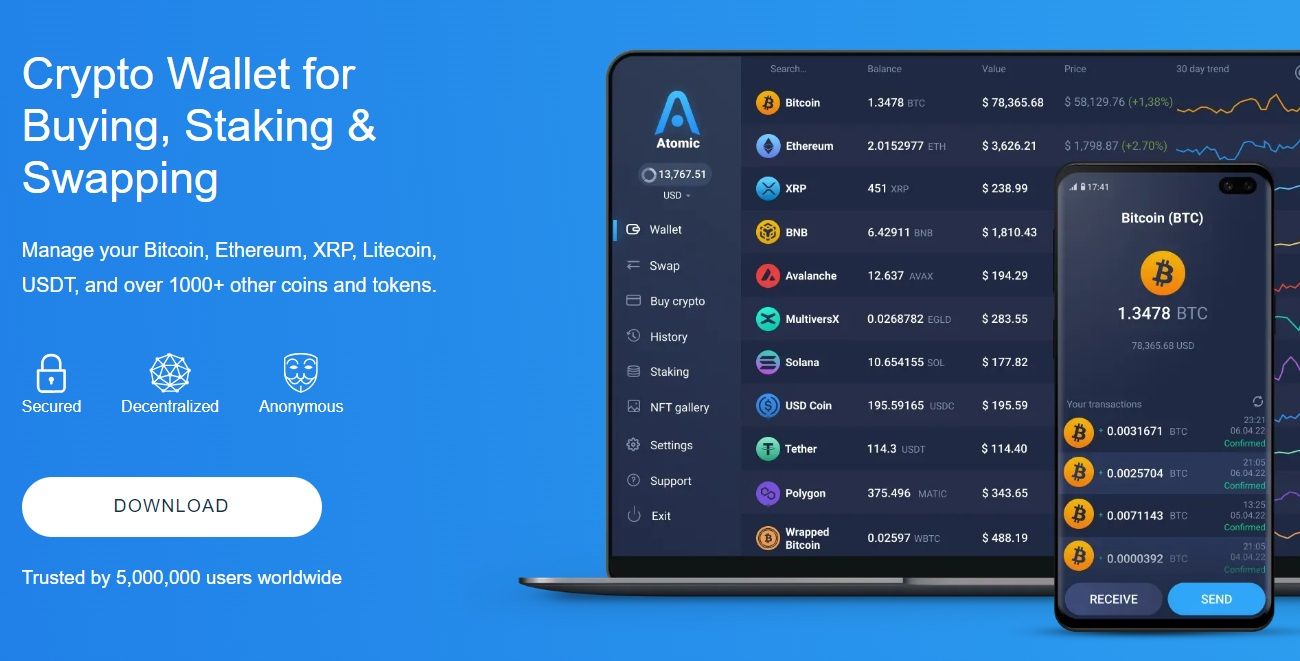 Available Across a Range of Platforms, Atomic Wallet Support The Avalanche C-Chain. Image via Atomic Wallet
Available Across a Range of Platforms, Atomic Wallet Support The Avalanche C-Chain. Image via Atomic WalletAvailable across various platforms including Windows, MacOS, Ubuntu, Android, and iOS, it supports the Avalanche C-chain. Its setup process is simple, and the wallet allows for atomic swaps, enabling direct peer-to-peer exchanges without intermediaries.
As a hierarchical deterministic wallet, it enhances privacy and security by generating new addresses for each transaction. Security measures include locally stored private keys, password protection, and optional biometric locks. Backup is facilitated through a 12-word mnemonic seed phrase.
We also have an Atomic Wallet review for your reading pleasures.
Exodus Wallet
Exodus is a user-friendly, non-custodial cryptocurrency wallet, available across desktop and mobile platforms. It offers a plethora of features catering to DeFi enthusiasts, supporting over 150 cryptocurrencies and facilitating access to decentralized applications and the Web3 ecosystem.
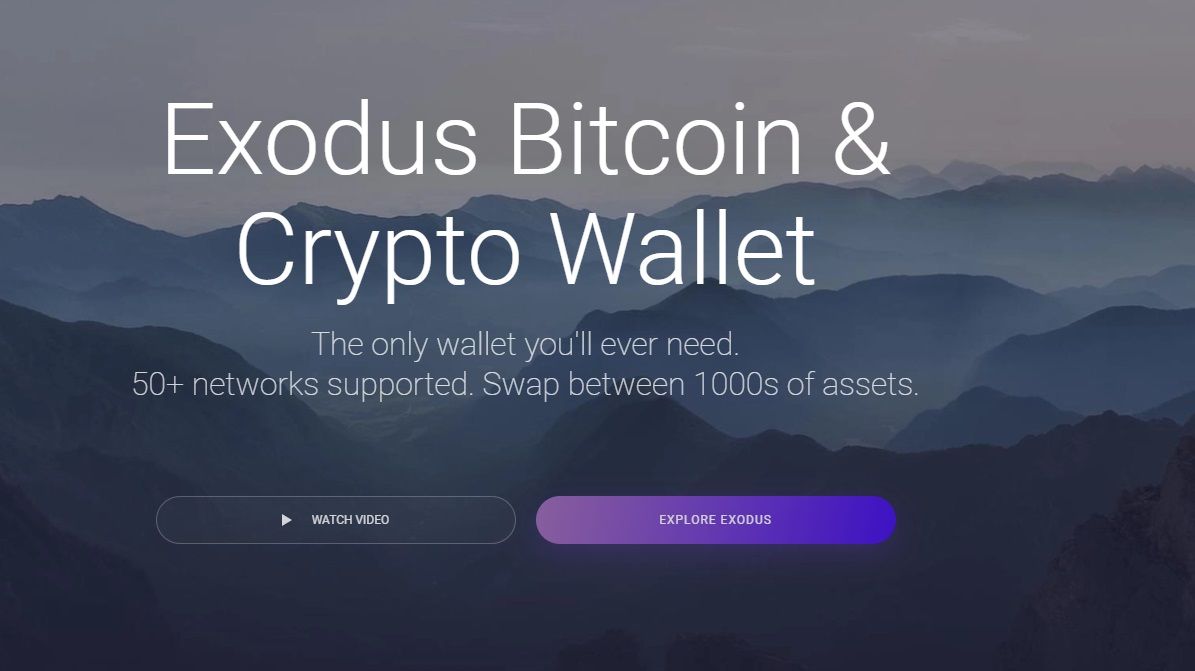 Exodus Is A Non-Custodial Wallet Available Across Desktop And Mobile Platforms. Image via Exodus
Exodus Is A Non-Custodial Wallet Available Across Desktop And Mobile Platforms. Image via ExodusKey features of Exodus Wallet include:
- Staking
- Swapping
- Support across mobile, desktop, and browser extension interfaces
- Integration with Trezor hardware wallets
While it boasts a user-friendly interface, multi-platform availability and no KYC requirements, users should note that fees for buying and selling may be higher compared to other wallets.
You can learn more in our full Exodus Wallet review.
Best Avalanche Wallets for DeFi
DeFi on Avalanche is fairly small compared to big names like Ethereum, Solana and Base. Still, Avalanche rounds out DefiLlama's ranking of top-10 networks by total value locked.
Speaking of, check out our top picks for the best AVAX DApps.
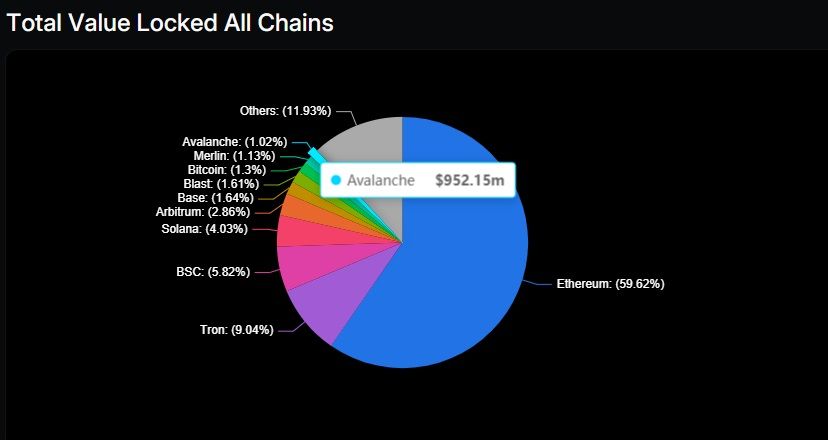 Avalanche's TVL is Within Striking Distance Of The Coveted $1 Billion Mark. Image via DefiLlama
Avalanche's TVL is Within Striking Distance Of The Coveted $1 Billion Mark. Image via DefiLlama
When considering the best wallets for DeFi on the Avalanche network, several options stand out:
- Core Wallet: Developed by Ava Labs, Core Wallet serves as an all-in-one self-custodial crypto wallet and web portfolio. It supports all three Avalanche chains, along with Bitcoin, Ethereum, and other EVM-compatible blockchains. With features like a user-friendly interface, cross-platform availability, staking of AVAX, and bridging capabilities for transferring assets to Avalanche DApps, Core Wallet offers a comprehensive solution for managing DeFi activities on the Avalanche network.
- MetaMask: MetaMask is a widely-used cryptocurrency wallet that offers support for Ethereum, its Layer 2 networks, and standalone EVM blockchains, including Avalanche's C-Chain. It provides seamless connection to DApps on compatible chains, allowing users to manage their crypto assets across both web and mobile devices. With features like swapping, bridging assets across different chains, and staking, MetaMask is a versatile choice for engaging in DeFi activities.
- Trust Wallet: Trust Wallet is another strong contender for DeFi enthusiasts on Avalanche. It offers a suite of features to ensure asset security, including the Trust Wallet Security Scanner and Encrypted Cloud Backup. Trust Wallet supports the Avalanche C-Chain and facilitates seamless transactions, including fiat-to-crypto conversions and swapping cryptocurrencies. With its non-custodial nature and emphasis on user control over private keys, Trust Wallet is a reliable option for DeFi participants.
Best Avalanche Wallets for Staking
If you're looking to stake your AVAX to generate yield, the following wallet would be solid choices:
- MetaMask: MetaMask is a versatile wallet that supports staking on the Avalanche network. It allows users to stake their AVAX directly from their MetaMask wallet, providing a seamless experience for earning rewards on their holdings.
- Trust Wallet: Trust Wallet also supports staking on the Avalanche network, enabling users to participate in staking activities directly from their wallet interface. With features like the Trust Wallet Security Scanner and Encrypted Cloud Backup, Trust Wallet ensures that staked assets remain secure.
- Core Wallet: Developed by Ava Labs, Core Wallet offers staking capabilities for AVAX, allowing users to earn rewards by staking their assets directly from the wallet interface. With its user-friendly design and cross-platform availability, Core Wallet provides a convenient option for staking on the Avalanche network.
- Ledger: For users who prefer hardware wallets, Ledger Live offers support for staking AVAX. By using a Ledger hardware wallet alongside the Ledger Live app, users can securely manage their AVAX holdings and participate in staking activities to earn rewards.
Best Avalanche Wallets: Closing Thoughts
Selecting the right wallet is crucial for maximizing your experience in the Avalanche ecosystem, whether you're engaging in DeFi activities or staking your AVAX tokens.
For DeFi enthusiasts, wallets like MetaMask and Trust Wallet stand out for their robust support of the Avalanche C-Chain, seamless connection to decentralized applications, and user-friendly interfaces. These wallets offer features such as swapping, bridging assets across different chains, and staking, empowering users to fully participate in the Avalanche DeFi landscape.
On the other hand, if you're looking to stake your AVAX tokens to generate yield, options like MetaMask, Trust Wallet, Core Wallet, and Ledger provide reliable support for staking activities. These wallets offer convenient interfaces and secure mechanisms for staking, ensuring that your assets remain protected while earning rewards on the Avalanche network.
Ultimately, the best wallet for you will depend on your specific needs, preferences and usage scenarios.





